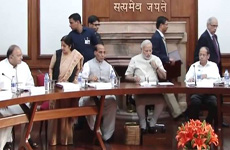The Union Cabinet chaired by the Prime Minister, Shri Narendra Modi, on Wednesday gave its approval to a comprehensive New Urea Policy 2015 for the next four financial years. The Policy has multiple objectives of maximizing indigenous urea production and promoting energy efficiency in urea units to reduce the subsidy burden on the Government.
IFFCO Managing Director Dr U S Awasthi hailed the approval to comprehensive New Urea Policy 2015 by the Prime Minister and said that with new NBS for P&K fertilizer the largest cooperative can meet the requirements of its members-farmers.
Tweeting on the occasion Dr Awasthi wrote” #IFFCO welcomes new #NBS for #P& K fertiliser. Now #IFFCO can meet members & farmers requirement @PMOIndia @AnanthKumar_BJP @arunjaitley.”
A PIB release said that savings in energy shall reduce the carbon-footprint and would thus be more environment friendly. It will enable the domestic urea sector having 30 urea producing units, to become more energy efficient, would rationalize the subsidy burden and incentivize urea units to maximize their production at the same time.
The policy will ensure timely supply of urea to farmers at same Maximum Retail Price (MRP) with lesser financial burden on the exchequer. It will also reduce import dependency in the urea sector.
Urea units would adopt best available technology in the world and will become globally more competitive. The Policy will result in direct saving of subsidy of around Rs. 2618 crore and indirect saving of Rs. 2211 crore (total savings will be Rs.4829 crore) on account of revised specific energy consumption norms and import substitution respectively during the next four years. It is expected to result in additional production of around 20 lakh/MT annually.
Earlier the Government had approved gas pooling policy under which all urea units would get gas at a uniform price. The MRP of urea for the farmers has been kept the same at Rs. 268/- per bag of 50 kgs. excluding local taxes. Farmers have to pay an additional price of only Rs.14/- per bag of neem coated urea.
The movement plan for urea would continue to be given by the Government every month to urea suppliers, to ensure its timely and adequate availability, in all parts of the country.
By all these measures, import dependency of India for urea is likely to reduce drastically. Presently, India is importing about 80 lakh metric tonnes of urea out of total demand of 310 lakh metric tones, reads the release.
Government also decided to continue the existing subsidy rates for Phosphatic and Potassic (P&K) fertilizers (22 grades including DAP, Single Super Phosphate (SSP), Muriate of Potash (MOP), etc.) under the Nutrient Based Subsidy (NBS) policy for the current year. Subsidy rate for DAP remains same at Rs 12350/- per metric tonne while it is Rs 9300/- for MOP. Separate subsidy for boron and zinc coated fertilizers has also been continued.
Movement plan for P&K fertilizers has also been freed to reduce monopoly of few companies in a particular area so that any company can sell any P&K fertilizer in any part of the country. Rail freight subsidy has been decided to be given on a lump sum basis so that the companies economise on transport. This will help farmers and reduce pressure on the railway network. The Government continues to have legal tools to direct fertilizer suppliers to supply fertilizers in any part of the country where there would be any shortage.
There are 19 units producing phosphatic fertilizers and 103 units making SSP. The entire requirement (approximately 30 lakh Metric Tonnes) of MOP is met from imports, since there is no resource of potash in India. About 90 percent of the phosphates are imported.
Subsidy would be payable to suppliers only after fertilizers are received in the districts and final settlement of subsidy claims will continue to be done only after acknowledgement of receipt of fertilizers by retailers. Quality certificates are to be given by the respective State Governments within six months from the receipt of fertilizers. If quality is sub-standard, subsidy will not be given to fertilizer suppliers.
